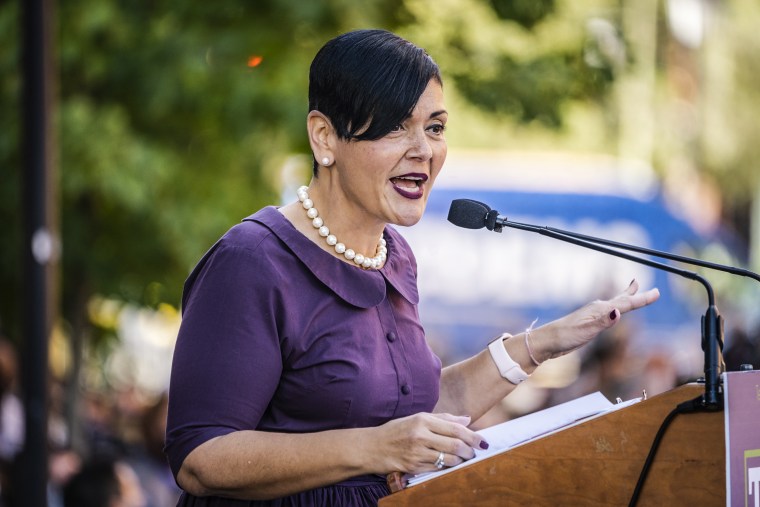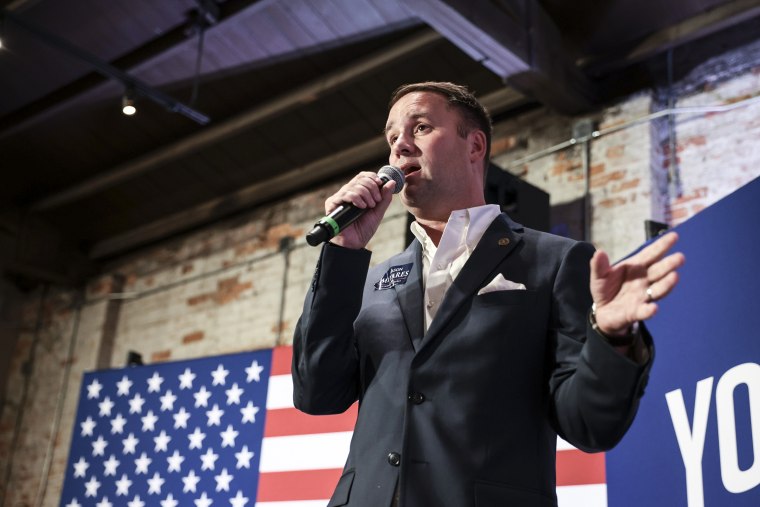Republican Jason Miyares, the son of a Cuban refugee, defeated the Democratic incumbent to become Virginia's first Latino attorney general and the first Hispanic elected statewide.
Miyares was officially declared the winner on Wednesday afternoon by NBC News after a very tight race.
Miyares had rooted his campaign in his mother’s flight from Cuba in 1965, saying often on the campaign trail that it was where his story started.
He congratulated his mom in a victory statement late Tuesday night. "Mom, you did well." She arrived from Cuba 56 years ago "with nothing but a dream, a dream for a better life for her family," he said.
"Now I stand here today — elected to be the attorney general of the Commonwealth of Virginia," Miyares said, referring to himself as the "first-ever son of an immigrant and the first Latino elected statewide in the Commonwealth's history."
With the win, Miyares, a Virginia House delegate and former prosecutor, denied Democrat Attorney General Mark Herring a third term.
Miyares' win was part of the Republican victory in the state, with GOP gubernatorial candidate Glenn Youngkin defeating Democratic candidate Terry McAuliffe.
Miyares had made history as the first Cuban American elected to Virginia’s General Assembly, in 2015. He represented the 82nd District in the House, which is about 83 percent white, 10.3 percent Black, 3.3 percent Asian and 5.3 percent Hispanic.
Miyares took a hard line on law enforcement issues, including attempts at police reforms. But the campaign was mired by Miyares’ attempts to tie Herring to allegations of misconduct by the state parole board, even though Herring has no power over the parole board’s decisions.
“On Day one, we’ll work toward a safe and secure Virginia and ending the criminal first, victim last mindset,” he stated. “Virginia has spoken. We want safe streets, we want our police to be well trained and supported in the community and we want the rule of law respected. I intend on delivering on my campaign promises.”
Democrats had hoped to be the first to elect a Latino to a statewide position, but Hala Ayala lost her bid for lieutenant governor to Winsome Sears, who is the first woman and first Black woman elected to the post.

Ayala, who identifies as Afro Latina, had already made history in 2017 when she was one of the first two Latinas elected to the state House of Delegates.
The other Latina elected that year, Elizabeth Guzman, won her House of Delegates race in District 31 Tuesday. Alfonso Lopez, also won his race in District 49.
Latinos gave Democrats strong support
Despite Ayala’s loss, the large majority of Latinos supported the Democratic candidates, according to NBC News exit poll numbers.
Sixty-six percent of Latinos voted for Democratic gubernatorial candidate Terry McAuliffe, while 32 percent voted for Republican gubernatorial candidate Glenn Youngkin, who won the race.
Latinos made up 5 percent of the state’s electorate. Almost half (48 percent) of Virginia Latinos identified as Democrat, 18 percent as Republican and 34 percent as Independent.
According to the NBC News Exit Poll, 32 percent of Latinos in the state voted for Miyares, while 67 percent voted for Herring.
Miyares has said in many interviews and on the campaign trail that his mother fled Cuba when she was 19, after seeing her brother taken from their home by security forces and then subjected to a mock execution. Miyares also said his father left the family when he was a teenager.
"My mother fled Cuba in October of 1965," Miyares told a crowd in October, The Washington Post reported. "And almost 50 years to the day she left she was able to go in the voting booth and get a ballot and vote for me to represent her in the oldest democracy in the Western hemisphere."
"That’s what I call the American miracle," he said.
Miyares has emphasized that his mother immigrated “legally” to the country.
Many people who came to the U.S. from Cuba after the 1959 Cuban revolution were regarded as refugees, including more than 200,000 who boarded U.S.-sponsored Freedom Flights from Cuba to the U.S. from 1965 to 1973, according to the Migration Policy Institute.
Cubans for years experienced preferential treatment for legal residency and citizenship in the U.S.
On his website, Miyares said he supports legal immigration, but he “will not allow illegal immigrants to take advantage of American laws and is in favor of efforts to strengthen border security.”
Follow NBC Latino on Facebook, Twitter and Instagram.

